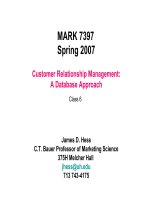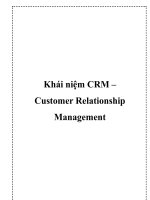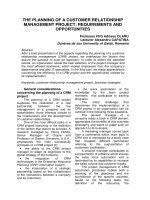Customer Relationship Management (CRM) potx
Bạn đang xem bản rút gọn của tài liệu. Xem và tải ngay bản đầy đủ của tài liệu tại đây (57.07 KB, 5 trang )
Customer Relationship Management (CRM)
Empowering Employees to Improve Customer Relationships
Do your employees have the authority to make decisions that will keep your customers happy? Or are they required to follow
the rules regardless of the situation? We take a look at how to empower your employees to improve customer relationships.
A solid customer relationship management (CRM) system will inevitably lead your employees to engage more deeply and more
consistently with your customers.
(article continues below)
Customer contact is a good thing, but what happens next?
In a well-structured CRM environment, employees who interact with customers have the authorization and ability to provide
total customer satisfaction. If the idea is to strengthen customer relationships (and it is), then sending staff into customer
engagements without the proper decision-making authority is counterproductive, at best.
The decision to empower your employees really has nothing to do with your employees at all. It has to do with your ability to
trust your workers and the belief in their competency to make the right decisions, knowing that micromanagement is not an
option.
Employee empowerment begins with a series of broad policies that define the boundaries of your workers' decision-making
authority. Your guidelines should reflect your comfort level as well as the needs of your customers, and should address the
following issues customer relations issues:
• Frontline data correction. Employees who were in direct contact with your customers should have the ability to make
changes to their contact information. If the customer has to take additional steps or contact another department for
corrections, he will quickly become frustrated and disillusioned with your customer management process.
• Refunds. Employees who work with customers frequently field requests for refunds and returns. It's important to give
your employees the authority to make refunds. But while you're at it, educate them about the circumstances in which a
refund is not appropriate.
• Discounts. Disgruntled customers can be transitioned into satisfied customers with something as simple as a discount
or coupon. Employees shouldn't have to get permission to offer discounts, provided it doesn't become routine or exceed
a reasonable dollar value.
• Penalty waivers. Many business owners get an ego boost from personally waiving or reducing penalty charges.
Although there is something satisfying about swooping in at the last minute to cancel a penalty, your employees will
appreciate the ability to do it themselves after you have articulated a penalty waiver policy.
Using CRM to Increase Your Profits
Written by James Garvin for Gaebler Ventures
CRM is the new way firms are building new competitive advantages as more and more
products become commoditized and compete solely on price. While firms struggle to find new
and innovative products, their attention has turned away from products and towards their
customers.
Customer Relationship Management ("CRM") is about knowing your customers, and using that
information to create greater value for your customers and for your firm.
(article continues below)
CRM enables a firm to identify and analyze their business at an individual customer
level, rather than at a mass customer level. Breaking your customers into various groups or
segments allow firms to identify trends and opportunities with their customers that help drive
better business and customer decisions.
CRM can be as simple as creating and managing a customer database with names and contact
information for your customers or as complex as building predictive models to determine
which customers are most likely going to respond to a marketing promotion campaign.
It has been known for a long time that customers are different. They are different in the way
they behave, what they buy, what they want, how much they are willing to pay, and their
reasons for buying from your company.
The old age of marketing treated all customers the same with mass marketing and
advertising, but only because firms did not have the methods or know how to treat and target
their customers differently based on their unique needs.
CRM helps a firm identify the unique wants and needs of their customers and helps a firm
determine how they change their offerings to create greater value for each individual customer
rather than offering every customer the exact same thing at the exact same time.
In today's digital age, firms are able to capture immense information about their customers
and leverage that information to provide more customized service for their customers. Every
customer has different needs and wants, and the ability to turn digital information into
information that helps you cater to those specific needs for each and everyone of your
customers is starting to unfold and will undoubtedly be a huge driving force behind successful
business.
Many firms in the past could lose a customer and never even know it. Now with CRM in effect,
a firm may be able to run a monthly report on customers who have not purchased in the last
12 months and customize an offer to those customers as way to bring them back to the
business. Once a customer is gone, it can be very difficult to bring them back and costs the
firm several fold more to acquire a new customer to replace the lost customer.
Because of its importance, CRM is used in all industries and in most businesses. As an
entrepreneur and small business, building a solid CRM solution early on will help you drive
greater customer satisfaction as you learn more about whom your customers are, what they
want, and how you can deliver the greatest value for them. CRM also enables a small business
to build closer relationships with their customers.
Marketers know that customers buy based on trust and relationships, not just on price, so
rather than try to compete on price, compete by building closer relationships with your
customers. One popular example of an effective CRM solution is using birthday promotions.
Birthday promotions show the customer that the business cares, knows who the customer is,
and usually provides some added benefit to the customer through a discount or other
promotional offer.
James Garvin began his education studying biotechnology. In recent
Social CRM
Social CRM is a relatively new term that applies CRM concepts to the booming social media
phenomenon. Learn how CRM is evolving to handle a world where social networking is
becoming the place where customers and prospects discuss their wants and needs.
Given the importance of customer relationship management (CRM) and the phenomenal
growth of social media, it was just a matter of time before the two were brought together.
(article continues below)
It's called social CRM and it could very well be the next big thing to hit the small
business workplace.
The basis for social CRM is the reality that social media has transformed the way businesses
and customers interact. With social media showing no signs of going away anytime soon,
social CRM is the attempt to integrate social media into the customer relationship
management process. Although it's still in its infancy, here's what it's all about and how it is
being implemented in small businesses.
What is social CRM?
The experts are still struggling to define the boundaries and ramifications of social CRM.
However, in its most general sense social CRM is the application of social media tools and
concepts to the relationships between companies and customers. The way it is executed can
vary from a simplistic business philosophy to a complex, technological solution. Yet the goal
remains the same: To facilitate deeper and more meaningful relationships with both existing
and prospective customers.
How is social CRM different from traditional CRM?
There are a number of important differences between social CRM and traditional CRM. Here
are just a few key differences:
• Data vs. content. Traditional CRM was all about collecting and managing data. In
today's social media-driven society, data is secondary to engagement. Social CRM
bridges the gap with compelling content that engages customers on increasingly
meaningful ways.
• Process vs. conversations. Two-way conversations are foundational for both social
media and social CRM. While traditional CRM emphasized the process of tracking
customers, social CRM emphasizes the company's conversations with its customer
base.
• Operations vs. people. Too often, the focus of traditional CRM was to enhance
operational effectiveness. But with social CRM, the focus shifts back toward people and
online communities.
How is social CRM applied in the small business workplace?
In theory, social CRM doesn't require anything more than an active presence on social media
websites like Facebook, Twitter, LinkedIn, etc. But in practice, the application of social CRM
concepts requires social CRM technologies and platforms. Social CRM solutions typically come
with features like online reputation monitoring and social analytics as well as opportunities for
forums, blogs and other customer engagement resources.
Related Articles
CRM Software
Even though CRM doesn't require pricey software, CRM software vendors make a strong case for the benefits of a technology-
rich CRM approach. We take a look at the value proposition for buying CRM software and what to look for in an effective
platform.
There is a common misperception that CRM has to be tied to the hardware and software systems that populate call centers and
customer service divisions.
(article continues below)
In reality, CRM is a comprehensive approach to customer management and relationship building that may or may not
center around advanced technological solutions.
Now that we've got that out of the way, here's how CRM plays out in the workplace: In the vast majority of businesses, CRM is
concentrated around a sophisticated system of software and hardware resources that integrate the company's sales, marketing,
customer service and management functions.
Do you absolutely need CRM software? No, but CRM software gives you the tools you need to perform effective customer
relationship management. If your business is serious about putting customers at the center of mission critical activities, CRM
software is an easy sale.
• Integration. CRM software makes it much easier to integrate customer management functions throughout the
company. Whether your solution is web-based or located on an internal server, employees have access to a single set of
customer data, updated in real-time.
• Customer Management. Call center personnel appreciate the fact that CRM software puts all of your customers'
information in one place. This reduces the possibility of decision-making based on faulty or incomplete information. It
also creates the potential for sales and marketing teams to track customer contacts and create scheduled contacts
without irritating your base.
• Collaboration. CRM software really excels in creating internal collaborations. For example, once your company's
management team decides to seriously pursue customer-driven sales and marketing strategies, CRM software makes it
easy to leverage customer feedback for the creation of targeted marketed campaigns.
• Data Access. The feature CRM software is most well known for is its capacity for giving key employees instant access
to customer data. Today's CRM solutions even give field staff the ability to access real-time data from anywhere in the
world.
• Reporting. Most CRM solutions provide reporting features that can be customized to your company's needs.
Dashboards, prebuilt reports and management analytics are just some of the features that come standard in a decent
CRM software solution.









